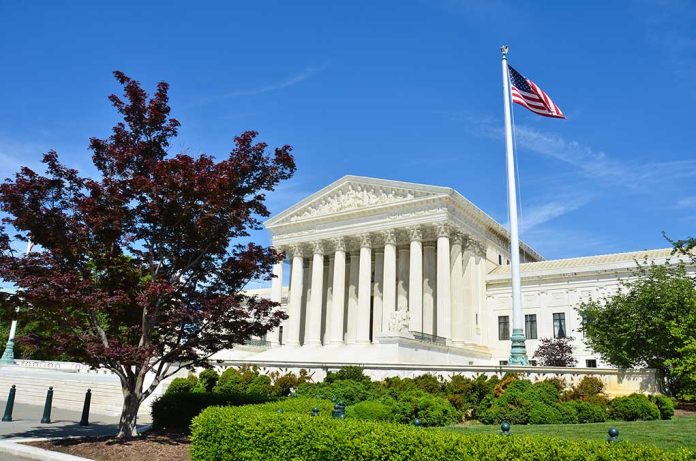
Supreme Court justices signaled they might allow energy companies to sue California over its strict vehicle emissions standards, potentially limiting the state’s ability to set climate policies that affect the national fuel market.
Key Takeaways
- The Supreme Court is considering whether to revive a lawsuit by Diamond Alternative Energy and industry groups challenging California’s authority to set stricter vehicle emissions standards than federal regulations.
- Energy companies argue California’s regulations cause them economic harm and effectively function as a “quasi-federal regulator” on climate change, raising constitutional concerns.
- California has set ambitious goals including 100% electric vehicles by 2036, which energy companies claim unfairly restricts their market operations.
- The case hinges on whether energy companies have legal standing to sue and if the Court can provide meaningful remedy for their claims.
- A ruling in favor of the energy companies could significantly impact state-level environmental regulations and reshape national climate policy under President Trump’s administration.
Energy Companies Challenge California’s Regulatory Authority
The Supreme Court is deliberating whether to revive a lawsuit brought by Diamond Alternative Energy LLC, a subsidiary of Valero Energy Corp., along with American Fuel and Petrochemical Manufacturers and other industry groups against California’s vehicle emissions standards. The case, formally known as Diamond Alternative Energy LLC v. Environmental Protection Agency (EPA), challenges California’s unique authority to set stricter vehicle emissions rules than federal standards. During oral arguments, several justices appeared receptive to the energy companies’ claims that they have standing to challenge these regulations.
The core legal question centers on whether these companies can demonstrate that California’s stringent emissions standards cause them direct economic harm and whether the Court can provide a meaningful remedy. The U.S. Court of Appeals for the District of Columbia Circuit previously dismissed the case, ruling that the companies lacked standing to sue. However, the Supreme Court’s willingness to hear the case suggests potential sympathy for the petitioners’ arguments that California’s regulations disproportionately impact their business operations.
The U.S. Supreme Court has agreed to review a critical case that could determine whether oil companies have the standing to challenge California's clean-car standards. https://t.co/BUW2WwMEIK#ClimateChange #CleanAir #ElectricVehicles #California #ShipandShoreEnvironmental
— Ship & Shore Environmental (@ShipnShoreEnv) January 17, 2025
Constitutional Concerns and Economic Impact
At the heart of the dispute is California’s aggressive push toward electric vehicles, including its goal of 100% electric vehicle sales by 2036. The energy companies argue that these regulations effectively discriminate against traditional fuel producers and refiners while artificially accelerating the market toward electric vehicles. They contend that California, with EPA waivers granted under the Biden administration, has essentially become a “quasi-federal regulator” on climate change, raising serious constitutional questions about federalism and the separation of powers.
The petitioners specifically take issue with provisions in the Clean Air Act that allow California to obtain waivers from the EPA to set its own emissions standards, which can then be adopted by other states. This creates a domino effect where California’s regulations can influence national policy without congressional approval. Energy companies argue this arrangement causes them concrete economic harm as their products face increasing restrictions in California and states that follow its lead.
Potential National Implications Under Trump Administration
The timing of this case carries significant weight given President Trump’s return to office. His administration has previously attempted to revoke California’s special authority to set separate emissions standards, and a favorable ruling for energy companies could provide legal backing for renewed efforts to limit state-level climate regulations. Several justices appeared to acknowledge the real-world economic impacts of California’s regulations, suggesting they might be inclined to recognize the energy companies’ standing to challenge these policies.
California defends its regulatory independence by pointing to decades of congressional acknowledgment of the state’s unique air quality challenges, which led to special provisions in the Clean Air Act. The state argues that Congress explicitly granted it the right to seek waivers from federal standards, creating a legitimate legal framework for its emissions policies. However, critics contend this arrangement bypasses normal constitutional checks and balances by giving one state outsized influence over national environmental policy.
With the Court’s decision expected by the end of June, the outcome could significantly reshape the landscape of environmental regulation in the United States, potentially strengthening the Trump administration’s ability to implement its energy policies by limiting state-level climate initiatives that contradict federal approaches. Energy producers are watching closely, as the ruling could determine their ability to challenge state regulations that impact national markets.
Sources:
- Justices Hear Case on California’s Auto Emissions Standards | C-SPAN.org
- Supreme Court Seems Inclined to Let Energy Companies Sue California Over Emissions Rules | The Epoch Times






